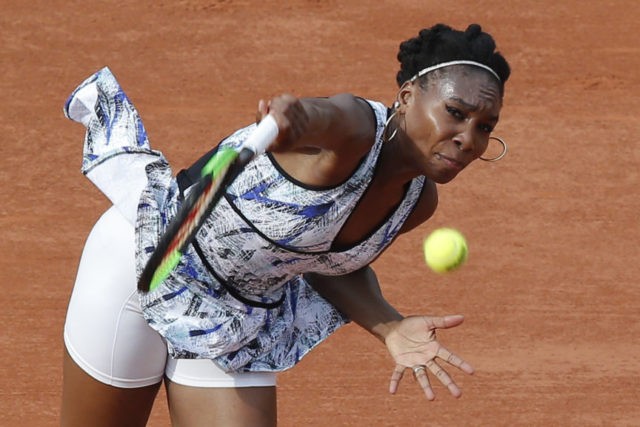PARIS—Venus Williams got her campaign underway for another Grand Slam trophy, beating China’s Qiang Wang on Sunday at the start of the French Open at Paris’s storied Roland Garros grounds.
Security is tight, with substantial deployments of national police and gendarmerie (militarized police) backing up the usual small contingents. The weather is humid – and hot for this time of year – but does not dampen the festive mood that always settles in here during the tournament. Roland Garros, as the Open is most commonly called, is a major event on the Parisian calendar; fans, including many Americans, pack the grounds in their tens of thousands every day. And even before the beginning of the second round on Wednesday, American athletes are experiencing their share of thrills and sorrows.
Playing in Suzanne Lenglen Stadium, Miss Williams (the French Open uses the honorific in referring to women, as in “40-30, Mademoiselle Williams”) took the first set without much trouble, but in the second had to come from behind and win a tiebreak to overcome the gritty and hard-hitting Chinese player, ranked 52.
The French Open is the only Grand Slam Venus Williams, currently No. 2, has never won. She was the 2002 finalist against her sister Serena, as she was at last January’s Australian Open. Serena is busy with forthcoming marriage and motherhood, and is not competing in Paris this year.
Several young American women lost in tough matches in the first two days of the tournament. The first round, with 256 players entered in the men’s and women’s draws, takes three days to complete, weather permitting. Jennifer Brady, 22, lost Monday evening at the end of a three-set, three-hour match in Chatrier Stadium to France’s top player, Kristina Mladenovic. She matched the 13th seed point for point and game for game to the very end, when she was unable to return a strong serve to her backhand at 40-15 in the 16th game of the deciding set. (The French Open does not resort to tiebreakers in third sets.)
It was a nerve-wracking match, with both young women bundles of anxiety, losing leads with serial double faults and taking turns being unable to choose between aggressive play and letting the other one beat herself.
The previous day, Sunday, a 15-year old phenomenon from New Jersey, Amanda Anasimova, took Japan’s Kurumi Nara, ten years older, to three sets too, and looked in command until she gave way to the pressure and strain of Miss Nara’s relentless defense.
American men showed extraordinary grit and talent too, making honorable, if bitterly early, exits. Donald Young fought the great Spanish veteran David Ferrer for four-and-a-half hours, with a fifth set going to 13-11. His powerful forehands were working (33 winners) as was everything else in his game, notably his eager energy, but Ferrer’s legendary resilience was on full display. It is based on a simple axiom: the match goes to whoever wins the last point.
Jared Donaldson, Frances Tiafoe, and the top American player at the moment Jack Sock showed what they can do, but did not play clutch when it mattered. Ryan Harrison and Bjorn Frantangelo fought hard, but were denied wins. At closing time, the American side did not show the sharp edge and determination that would let you believe the great American contingents of yore were returned to the legendary stadium.
Small units remain in action: Steve Johnson and Bethanie Mattek-Sands are through to the second round; others have not been heard from yet. But, outside Venus Williams, expectations perforce must be modest.
And yet – that may be a fact, but it is not an attitude. At the end of the qualifying tournament last week, Bjorn Fratangelo found himself in the very last points of a desperately close match on Court Six against Gerald Melzer. The qualifiers are played in three sets with tiebreakers, and when they got to it, several Americans entered and took seats in the grandstand. Nods were exchanged, eyes met, and Bjorn ran off five points in a row, something he had not done in three sets. On the next point he slipped and fell. He picked himself up, changed sides, as required after six points, and took the next two and with them the match.
Solidarity, moral support, pride: They all know what they have to do.

COMMENTS
Please let us know if you're having issues with commenting.